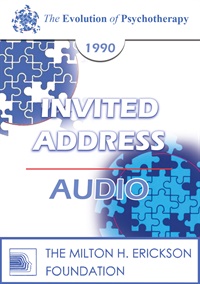
- Average Rating:
- Not yet rated
- Topic Areas:
- Invited Addresses | Couples Therapy | Sex and Sexuality | Interviewing | Therapist Development | Treatment Planning
- Categories:
- Evolution of Psychotherapy | Evolution of Psychotherapy 1990
- Faculty:
- Helen Singer Kaplan, MD, PhD | Joseph Wolpe, M.D.
- Duration:
- 1 Hour
- Format:
- Audio Only
- Original Program Date:
- Dec 15, 1990
- Short Description:
- The evaluation is the single most important clinical task of therapists who work with sexual problems. That is because accurate assessment is the key to successful treatment, and many unnecessary therapy failures can be traced to inadequate evaluation procedures and to the failure of the therapist to elicit pertinent information. Traditional psychological and psychiatric examinations, which emphasize the childhood roots of sexual problems are not adequate for evaluating sexual disorders. Dr. Kaplan will demonstrate her method of evaluation, which focuses on the patient's or couple's current sexual behavior and experience. This, together with historic information, provides the information required for understanding the dynamics of the dysfunction and for formulating a rational treatment plan.
- Price:
- $15.00 - Base Price
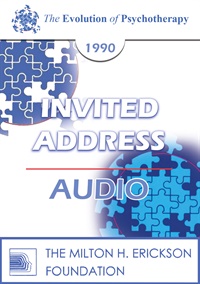
- Average Rating:
- Not yet rated
- Topic Areas:
- Invited Addresses | Reality Therapy | History of Psychotherapy | Psychotherapy
- Categories:
- Evolution of Psychotherapy | Evolution of Psychotherapy 1990
- Faculty:
- William Glasser, MD | Jeffrey Zeig, PhD
- Duration:
- 1 Hour 28 Minutes
- Format:
- Audio Only
- Original Program Date:
- Dec 15, 1990
- Short Description:
- This address includes a brief history of Reality Therapy, and explains that it is based on control theory and that it is applied to both counseling and managing clients. Case examples are used to show that it is composed of two major components: Creating the counseling environment and the procedures that lead to change.
- Price:
- $15.00 - Base Price
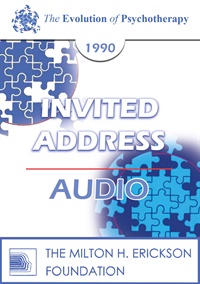
- Average Rating:
- Not yet rated
- Topic Areas:
- Invited Addresses | Addiction | Community | Social Issues | Psychotherapy
- Categories:
- Evolution of Psychotherapy | Evolution of Psychotherapy 1990
- Faculty:
- Thomas Szasz, MD | Rollo May, PhD
- Duration:
- 1 Hour 20 Minutes
- Format:
- Audio Only
- Original Program Date:
- Dec 15, 1990
- Short Description:
- Dr. Szasz will present a brief historical review of drug controls in the United States; a critical analysis of the transformation of the trade in drugs from a free market at the beginning of the century to a tightly statist system of controls today; and a market-oriented analysis of the "drug problem."
- Price:
- $15.00 - Base Price
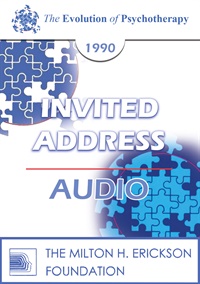
- Average Rating:
- Not yet rated
- Topic Areas:
- Invited Addresses | Consciousness | Psychotherapy | Relationships
- Categories:
- Evolution of Psychotherapy | Evolution of Psychotherapy 1990
- Faculty:
- James Hillman, PhD | Alexander Lowen, MD
- Duration:
- 1 Hour 30 Minutes
- Format:
- Audio Only
- Original Program Date:
- Dec 15, 1990
- Short Description:
- Psyche has been located wholly intrapersonally (within the individual} or interpersonally (between persons, families, groups}, but never is it conceived also extra-personally as a component of the world, as a world soul or anima mundi in the classical sense.
- Price:
- $15.00 - Base Price
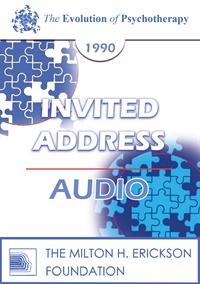
- Average Rating:
- Not yet rated
- Topic Areas:
- Invited Addresses | Gestalt | Psychotherapy | Therapist Development
- Categories:
- Evolution of Psychotherapy | Evolution of Psychotherapy 1990
- Faculty:
- Erving Polster, PhD | Ernest Rossi, PhD
- Duration:
- 1 Hour 24 Minutes
- Format:
- Audio Only
- Original Program Date:
- Dec 15, 1990
- Short Description:
- The concept of the Self has come to imply a consistent cluster of characteristics which are often given fixed and universal attributes, such as the narcissistic self, topdog and underdog, false and true self, etc. This paper will expand the concept to include the versatility and unique aliveness of the individual's many selves and show how these selves help people make sense of their lives. Special attention will be given to broadening the concepts of introjections, transference, and gestalt formation, showing how these may be instrumental in harmonizing alienated selves.
- Price:
- $15.00 - Base Price
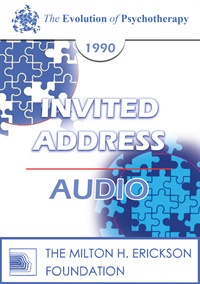
- Average Rating:
- Not yet rated
- Topic Areas:
- Invited Addresses | Femininity | Gender | Psychotherapy
- Categories:
- Evolution of Psychotherapy | Evolution of Psychotherapy 1990
- Faculty:
- Miriam Polster | James Bugental, PhD
- Duration:
- 1 Hour 20 Minutes
- Format:
- Audio Only
- Original Program Date:
- Dec 15, 1990
- Short Description:
- Our present ideals of heroism are dominated by unrealistic and larger-than-life stereotypes. Not only has this narrow view eliminated much of the heroism of women, it has also provided men with simplistic solutions that are not only outmoded, but intimidating. Ultimately, it has deprived both sexes of a wide range of heroic examples and choices that could enrich their lives and the lives of those around them. This paper proposes a redefinition of heroism that expands traditional images and suggests that recognizing the unhackneyed heroism that occurs in ordinary circumstances may also enrich therapeutic possibilities.
- Price:
- $15.00 - Base Price
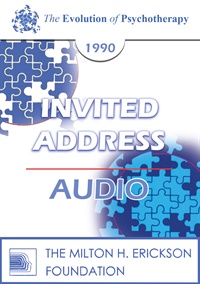
- Average Rating:
- Not yet rated
- Topic Areas:
- Invited Addresses | History of Psychotherapy | Psychotherapy | Therapist Development
- Categories:
- Evolution of Psychotherapy | Evolution of Psychotherapy 1990
- Faculty:
- Rollo May, PhD | James Hillman, PhD
- Duration:
- 1 Hour 6 Minutes
- Format:
- Audio Only
- Original Program Date:
- Dec 16, 1990
- Short Description:
- Epicurus, Kierkegaard, and Nietzsche are forefathers of contemporary psychotherapy. Freud was aware of these wellsprings of modern therapy, and Jung brings them specifically into his writing and his methods. We not only get hints from these forefathers, but we also find a lasting base in them, such as Bubar's "l-thou" construct or Kierkegaard's emphasis on the ultimate relationship of the self to life. These ideas are assumed in Freud, Jung, Adler, Rank, Fromm and other leading therapists in our day. It is these latter therapists who have given us the web of ideas which underlie contemporary psychotherapy.
- Price:
- $15.00 - Base Price
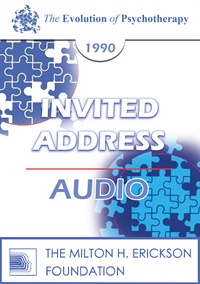
- Average Rating:
- Not yet rated
- Topic Areas:
- Invited Addresses | Psychotherapy | Therapist Development
- Categories:
- Evolution of Psychotherapy | Evolution of Psychotherapy 1990
- Faculty:
- James Bugental, PhD | Erving Polster, PhD
- Duration:
- 1:30:07
- Format:
- Audio Only
- Original Program Date:
- Dec 16, 1990
- Short Description:
- Human experience and human action center in and derive from human subjectivity. Our preoccupation with objectivity results displaces identity from inner living to external. Life-changing psychotherapy requires centered awareness and self-direction. Three therapeutic elements are prime: Full presence, major commitment, and exploring client's self-and-world constructs.
- Price:
- $15.00 - Base Price
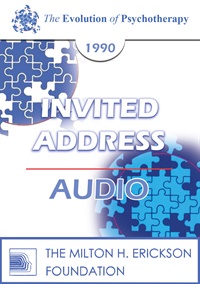
- Average Rating:
- Not yet rated
- Topic Areas:
- Invited Addresses | Borderline | Narcissism | Personality Disorders | Attunement | Therapeutic Relationship | Psychotherapy
- Categories:
- Evolution of Psychotherapy | Evolution of Psychotherapy 1990
- Faculty:
- James F. Masterson, MD | Helen Singer Kaplan, MD, PhD
- Duration:
- 1 Hour 29 Minutes
- Format:
- Audio Only
- Original Program Date:
- Dec 16, 1990
- Short Description:
- The importance of therapeutic alliance is described. Therapeutic alliance, transference, and transference acting-out are defined and distinguished from each other and the therapeutic task of helping the patient to convert transference acting-out to therapeutic alliance and transference is outlined. The differences in the form and content of the intrapsychic structure are described to show why different therapeutic techniques are necessary to establish the therapeutic alliance: Confrontation with the borderline and mirroring interpretation of narcissistic vulnerability with the Narcissistic Personality Disorder. A brief case illustrates each.
- Price:
- $15.00 - Base Price
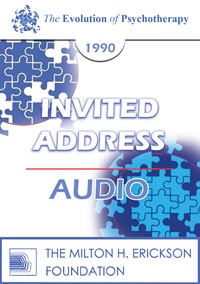
- Average Rating:
- Not yet rated
- Topic Areas:
- Invited Addresses | Psychotherapy | History of Psychotherapy | Transference / Countertransference
- Categories:
- Evolution of Psychotherapy | Evolution of Psychotherapy 1990
- Faculty:
- Judd Marmor | Arnold Lazarus, Ph.D.
- Duration:
- 1 Hour 29 Minutes
- Format:
- Audio Only
- Original Program Date:
- Dec 16, 1990
- Short Description:
- The emphasis in Dynamic Psychotherapy over the past few decades has shifted from a focus on insight and the recovery of early memories to a recognition that the quality of the patient-therapist relationship is the quintessential factor upon which the success of therapy depends. This involves both the real relationship and transference-countertransference elements, all within a systems-theory orientation.
- Price:
- $15.00 - Base Price
Please wait ...

